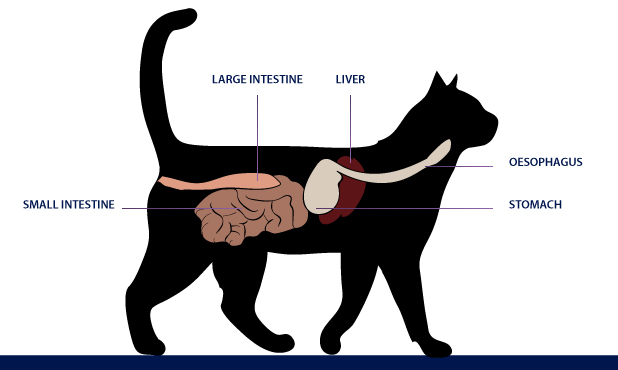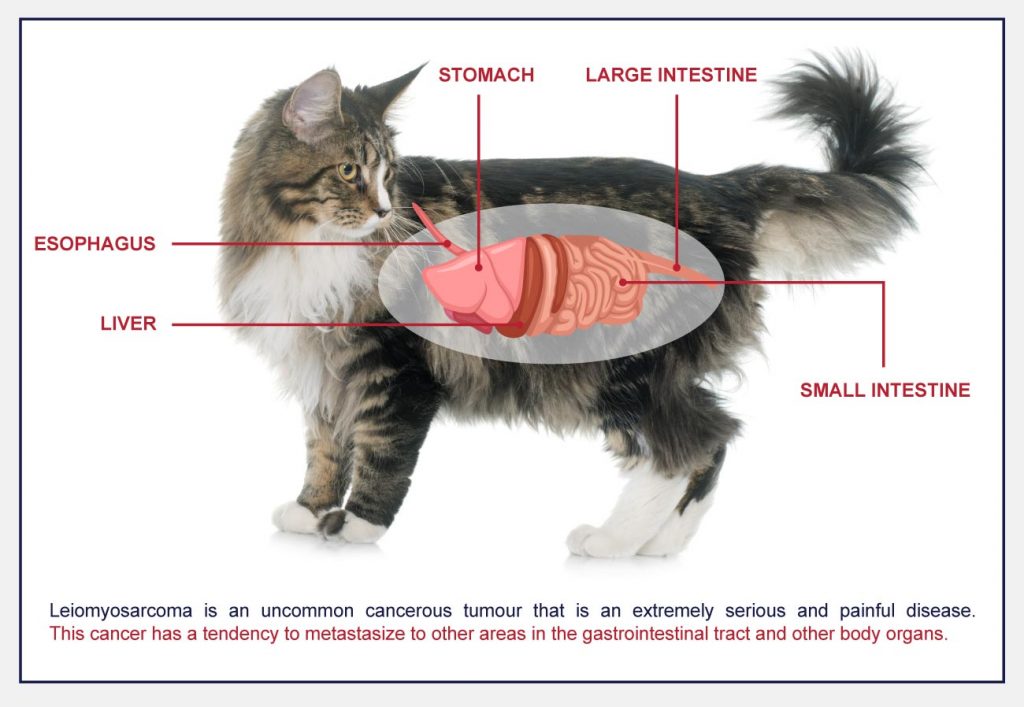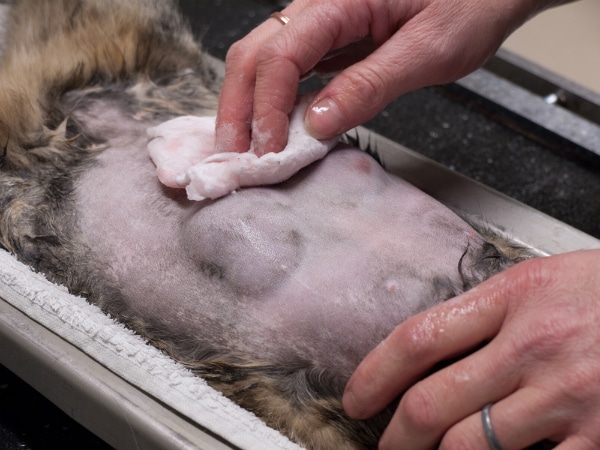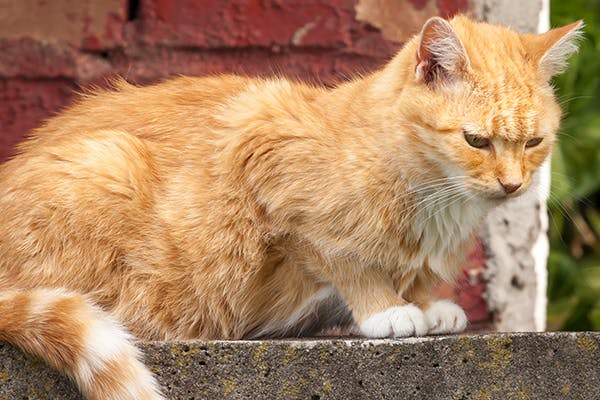Stomach and intestinal tumors can be benign but are typically malignant and aggressive. The following signs and symptoms may indicate that a cat has developed this kind of cancer.
 Stomach And Intestinal Cancer Leiomyosarcoma In Cats Petlifesa
Stomach And Intestinal Cancer Leiomyosarcoma In Cats Petlifesa
The main symptoms include abdominal enlargement vomiting often with blood weight loss due to poor digestion and weakness.

Stomach cancer in cats. Cats tend to be good at hiding the fact they are in discomfort. 12 Warning Signs of Cancer in Cats Weight loss even if your kitty seems to be eating the same amount as ever. The most common symptom of stomach cancer in cats is the growth of a tumor which may be benign or cancerous.
An adenocarcinoma is a carcinoma of the glands and can appear in the epithelial layer of the organ in question. Signs of Stomach Cancer in Cats. Symptoms of Stomach Cancer in Cats.
Cat stomach cancer is a type of cancer that falls under the classification of an adenocarcinoma. A malignant tumor can severely affect different organs and also cause a range of problems including. GI lymphoma occurs mostly in older cats from 9 to 13 years of age and is most often detected in the small intestine.
These should be clearly visible. Unusual lumps or swellings anywhere on your cats body especially if theyre getting larger or changing shape. Theresa Arteaga DVM DACVIUM Oncology owner of Animal Cancer Center in Monterey California.
Cats who undergo successful surgery for stomach cancer may gain an additional 12 to 14 months of life. Stomach and intestinal cancer is a rare type of feline cancer accounting for less than one percent of all reported cancers in cats. Watch for these common symptoms of stomach cancer.
Stomach Cancer in Cat Diagnosis Your vet will perform a thorough physical exam including feeling your cats belly for any masses. Gastrointestinal cancers are most commonly found in the small intestine. Most cases of stomach cancers are gastric carcinomas which can be divided into a number of subtypes including gastric adenocarcinomas.
Sudden weight gain or bloating can be a sign of cat cancer specifically GI in cats. Leiomyosarcoma of Stomach Small and Large intestine in Cats. Learning the signs to watch for might just save your cats life one day.
Abdominal tumor is among the rarest forms of cancer in cats and most difficult to treat successfully before progressing to an advanced stage. One of the most common cancers we see in cats is lymphoma which is associated with the feline leukemia virus FeLV. Lymphoma typically happens in older felines and most commonly occurs in the small intestines says Dr.
Even though theres a vaccine for feline leukemia now we still see a number of. Benignity and malignancy depend on the type of cancer. Feline lymphoma usually strikes the digestive system causing excessive vomiting and diarrhea.
Stomach and intestinal cancer is a rare type of feline cancer accounting for less than one percent of all reported cancers in cats. Benignity and malignancy depend on the type of cancer. According to the Pet Cancer Center the most frequent signs of stomach cancer in cats include.
Very few mammary gland growths in cats are benign85 to 90 percent are malignant and spread to lymph nodes lungs and the chest cavity. Swollen lymph nodes are a symptom of lymphoma. Stomach and intestinal tumors can be benign but are typically malignant and aggressive.
Redirected from Stomach cancer in cats and dogs Stomach cancer also known as gastric cancer is a cancer that develops from the lining of the stomach. Until the pain becomes severe you may not notice anything is wrong with your cat. Lymphoma is by and large the most common cancer that affects cats although there are other types of feline cancers that can affect domestic cats.
This extremely dangerous and painful disease affects mostly older cats more than six years old though all breeds are equally predisposed to leimyosarcoma. Mammary Gland Breast Cancer Mammary gland carcinoma or breast cancer affects 17 percent of female cats and is the third most common type of cancer in cats. Stomach cancer in cats is often a silent killer because a cat shows very general symptoms that make it difficult to diagnose.
A sudden spike in. Leiomyosarcoma is an uncommon cancerous tumor which in this case arises from the smooth muscles of the stomach and intestines. Appetite loss or sudden weight loss.
If your cat is eating less but seems to be bulking up take a trip to the vet says Rocha. Gastrointestinal cancers are most commonly found in the small intestine. Anemia often caused by bleeding ulcers Bloody feces stools often appear very black like tar.
Lymphoma and lymphosarcoma Lymphoma is the most common form of cancer in cats which is often associated with feline leukemia virus and accounts for 25 percent of all cases. Cats with stomach cancer do not have a very positive prognosis because of the possibility of the cancer being fast-growing and malignant. The prognosis for cat stomach cancer is usually poor due to the fact that by the time stomach cancer is detected the disease has usually metastasized to the lymph nodes and from there to other organs.
He or she will then perform x-rays andor an ultrasound to look for tumors. Stomach cancer in cats also causes a range of gastrointestinal problems including.
 Stomach And Intestinal Cancer Leiomyosarcoma In Cats Petlifeca
Stomach And Intestinal Cancer Leiomyosarcoma In Cats Petlifeca
 7 Things You Need To Know About Breast Cancer In Cats Catster
7 Things You Need To Know About Breast Cancer In Cats Catster
 Intestinal Cancer Adenocarcinoma In Cats Petmd
Intestinal Cancer Adenocarcinoma In Cats Petmd
 Stomach Cancer In Cats Lovetoknow
Stomach Cancer In Cats Lovetoknow
 Coping With Cat Cancer Symptoms And Advice Blue Cross
Coping With Cat Cancer Symptoms And Advice Blue Cross
 Homeopathic Approach To Cancer In Companion Animals Ivc Journal
Homeopathic Approach To Cancer In Companion Animals Ivc Journal
 Stomach And Intestinal Ulcers In Cats Symptoms Causes Diagnosis Treatment Recovery Management Cost
Stomach And Intestinal Ulcers In Cats Symptoms Causes Diagnosis Treatment Recovery Management Cost
 Leiomyosarcoma Stomach Cancer In Cats Huntersville Veterinary Surgeon Surgery For Leiomyosarcoma
Leiomyosarcoma Stomach Cancer In Cats Huntersville Veterinary Surgeon Surgery For Leiomyosarcoma
